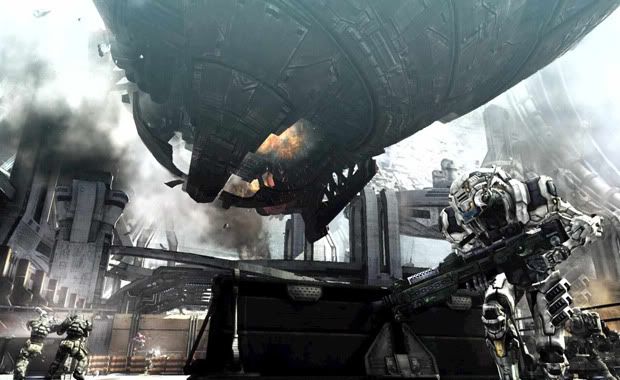My oldest friend betrayed me today.
If I hadn't made a split-second decision, he would have ruined my entire life in one fell swoop. I'm lucky to still be standing, but it doesn't mean he left me unscathed. It's natural to leave myself vulnerable to the people I love and care about. At least, that's what I keep telling myself.

As a lifelong gamer, I use this medium to cope. Whether it be the death of a close friend or the loss of an important job, I play video games to carry on, and it works. My coping mechanism for this week was Vanquish, an amazing third-person shooter by Platinum Games.
I've held onto the last act of the game for a couple of weeks now, but this incident sent me back to the couch to finish it off.
I'm sure ironic things happen to me all the time, and I simply don't notice them. Once in awhile, though, irony hits me in the face like a bat.
In the last act of the game, my main brohan-in-action decides to betray me. As a result, I had to fight him as a boss. I don't think Vanquish has a particularly interesting story, but sometimes despite a particularly awful excuse for a narrative, I still fall in love with the characters (I think the Lost television show is a fitting example of this, too).
I was betrayed by one of the two people in that game who weren't trying to kill me, and it was a little unsettling — especially since I liked that character. It takes me out of my comfort zone to have to fight and kill someone that I want to see alive. But at the time same time, I acknowledge that this character has to die for both the resolution of the story and for the simple fact that he's a boss is a video game.

It's an interesting mechanic that is often handled poorly. An example is the awful narrative in Call of Duty: Modern Warfare 2. Just like the rest of that story, the betrayal at the end of the game is meaningless and unmoving. Then we have games like Heavy Rain that have a betrayal so crippling to me that I didn't want to finish. The difference is between deception by someone you already hate and treachery from someone you genuinely like.
In Devil Survivor, you're constantly at odds with former friends and allies because it's impossible for everyone to have the same opinion and fight for the same cause, which conflicts with my natural strategy of befriending the entire cast.
For one reason or another, I had to kill several buddies by the end of my journey, and it never got easier. I was tempted several times to turn off the game and walk away without finishing it. I didn't want to keep killing friends and dealing with these painful situations. I continued through the end because it was a video game and I really wanted to beat it.

Back in real life, I'm now faced with my next step. Unlike a video game, I don't actually have to resolve this disloyalty in any particular way. I'm more angry that I can no longer be friends with him because of his dishonesty than I am about the betrayal itself. The damage was done, and all that's left is my move.
My current options are retaliating, forgiving, or moving on without doing anything about it at all. I can not bring myself to forgive him, and although thoughts of revenge and anger flow through me, I have the self control not to retaliate. He made a poor decision that he thought was right — knowing full well the consequences — and I suffered greatly for it.
For once, I'm glad life isn't a game because I have no desire to move forward regardless of the results. This ends with us not being friends anymore, and I'm glad that I avoided the worst-case scenario. No further action is required.
Chris Davidson is a stand-up comedian, writer, podcaster, and engineer. You can follow him on Twitter @CWDavidson and listen to his comedy podcast, I Hope You Die Radio, on iTunes or here.

